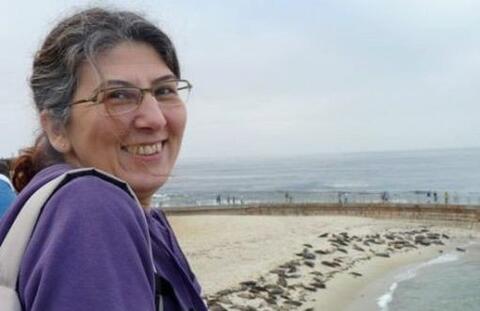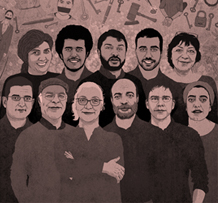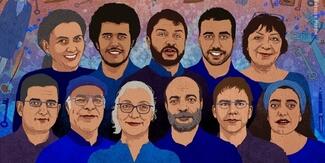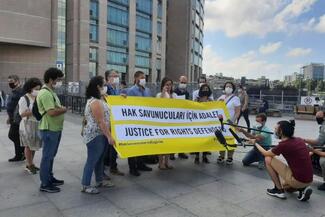
BIANET Concluding the application of rights defender Özlem Dalkıran, who was on trial in the Büyükada case, the Constitutional Court has unanimously concluded that her right to personal liberty and security was violated by her imprisonment. Constitutional Court has handed down its ruling on the application of rights defender Özlem Dalkıran, who was on trial in Büyükada case. The Court has concluded that her right to personal liberty and security guaranteed by Article 19 of the Constitution has been violated and ruled that Dalkıran shall be paid 40 thousand lira in non-pecuniary damages. The ruling has been handed down unanimously by Presiding Judge Zühtü Arslan, Vice Presiding Judges Hasan Tahsin Gökcan, Kadir Özkaya and members Engin Yıldırım, Hicabi Dursun, Celal Mümtaz Akıncı, Muammer Topal. Speaking to bianet about the ruling, Özlem Dalkıran has reminded us that the case is still awaiting an examination and ruling by the Court of Cassation and said, "It is happy news, but this is not over." The top court has also found it "admissible" with a majority of votes that Özlem Dalkıran's right to personal liberty and security has been violated on the grounds that her imprisonment was not lawful. CLICK - 'Your Support Makes Us Resilient in Prison' Of 10 human rights defenders who met for a workshop in a hotel in Büyükada, İstanbul, Özlem Dalkıran was detained in a police raid on July 5 and arrested on July 18. She remained behind bars until October 25, 2017. She was sentenced to 1 year, 13 months in prison in the ensuing trial known as the Büyükada case. The appeals process is still ongoing.
'On behalf of all human rights defenders...'
Özlem Dalkıran has noted that the Constitutional Court has referred to her as a human rights defender. "I accept it with great pleasure on behalf of all human rights defenders," Dalkıran has commented. The related part of the Constitutional Court ruling briefly reads as follows: "The applicant, who is one of the founders of Amnesty International Turkey, is a human rights defenders known in civil society, primarily in the Hrant Dink Foundation and Helsinki Citizens Assembly."
'No evidence presented as to the accusation'
Özlem Dalkıran has also underlined that with this ruling handed down by the Constitutional Court, it is now confirmed that the most basic duty to be fulfilled by the İstanbul 35th Heavy Penal Court, where the trial was held, and the court of appeals (Regional Court of Justice), namely the prosecutor's obligation to prove the crime, was not fulfilled. The ruling of the Constitutional Court has indicated that "there was no evidence as to the fact that the meeting was secret," noting that "even when the meeting had been secret, it would not have constituted a crime in itself." The ruling of the top court has also noted that "no evidence was presented as to the fact that the meeting was held for aiding terrorist organizations or espionage or that the issues discussed in the meeting constituted a crime." According to the ruling, it was also not inquired why it was considered crime evidence that Dalkıran said in WhatApp messages that the electronic devices were turned off until they arrived at the hotel. "According to the applicant's defense and the scope of the file, it has been concluded that strong indication regarding the committal of the crime necessary for the imprisonment in the concrete case was not sufficiently put forward," the Constitutional Court has said in its ruling.
'Arrest warrant is against the law'
The ruling has underlined that the arrest of Dalkıran was against the law and she shall be paid damages for this violation. "In the application, it has been concluded that the Article 19/3 of the Constitution was violated as the imprisonment was not lawful," the top court has noted. The Constitutional Court has also examined Özlem Dalkıran's allegation that the detention was against the law and the period of detention was surpassed, which led to a violation of her right to personal liberty and security. The Court has found this application inadmissible on the grounds that not all legal remedies have been exhausted. Moreover, the alleged violations of right to a free trial, presumption of innocence and the right to dignity and respect are also found inadmissible. CLICK - Four people sentenced to prison in Büyükada trial
Dissenting opinion by court members
In their dissenting opinion to the ruling, Constitutional Court members Rıdvan Güleç and Basri Bağcı have noted that the arrest of Dalkıran was groundless: "What was done in giving a ruling of arrest was nothing other than listing the evidence in the file in headings. "It is seen that it was not adequately evaluated why a meeting which would have been expected to be held in a very secret manner, as required by the quality of the crime, was held in the hall of a hotel with open doors and why the interpreter to work in the meeting was hired from the market in a way that would have not complied with the quality of the related incident." The dissenting opinion of the top court members has also noted that "a ruling of arrest was given without adequately discussing why the other protection measures, instead of arrest, would fall short while another protection order should have been imposed on the applicant."




